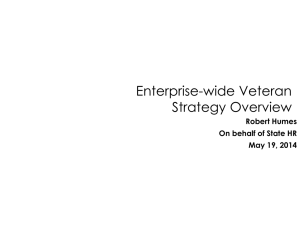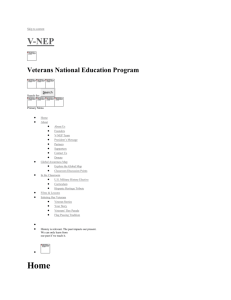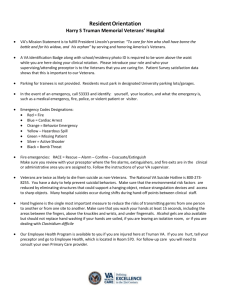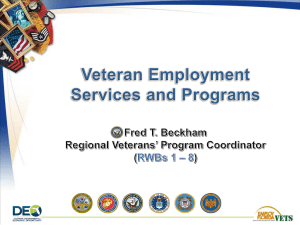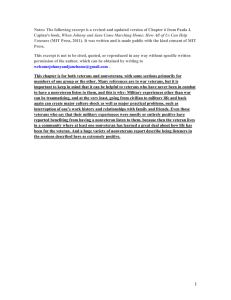What Will be Audited? - Department of Economic Opportunity
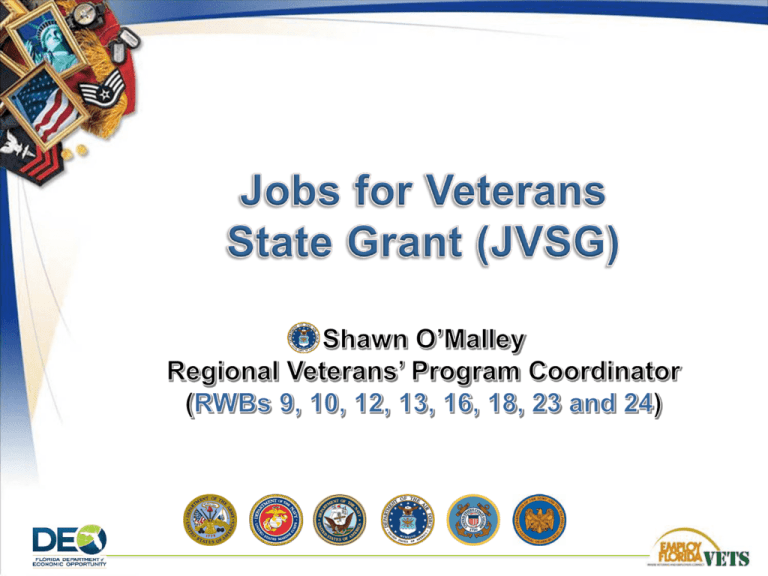
So you’re going to be Audited… When to prepare Who will conduct the audit? What will be audited? What is my role in an audit? Who else will participate? The day of the audit What to bring and what to expect Your next steps Audit Best Practices
First thing – B R E A T H E!
• Audits are important. They are urgent. And they are necessary • You may have some anxiety after hearing stories about other Regions that went through difficult audits and “how bad it was”
continued • Many people feel unprepared for a compliance audit…but why?
• Bottom Line - Worrying about an audit is like worrying about the weather. The only part under your control is how prepared you are
Short answer is:
Right now!
When it comes to audits, the saying, “an ounce of prevention is worth a pound of cure” certainly rings true Document everything you do in EFM
“Be a SME”!!
Non-DEO audits are conducted by the US Department of Labor (USDOL), Veterans Employment and Training Service (VETS) Florida’s Director, Veterans’ Employment and Training Service (DVET) Assistant Director for Veterans' Employment and Training (ADVET)
continued When invited (and as observers only) State Veterans' Program Coordinator Assistant State Veterans' Program Coordinator Regional Veteran Program Coordinators
Basically everything you’ve done and even what you haven’t But you probably want to know specifics?
Intake (how, who, effectiveness, process, results, etc.) Services Provided (to SBE vets, non-vets, non-SBE vets, results) Timeliness of services (when, how, results) Case notes (SBE listed, what happened, why, how, impact, etc.)
continued IEP (short/long term goals, roadmap, changes, follow-up, results, etc.) Follow-up (scheduled, documented, meaningful, results) Outreach (where, when, why, results) Employer contacts (when, where, how often, documented, results) Position Description (signed, current, understood, updated?) Processes (everything vet related, especially POS processes)
What will be expected of you?
You will be asked many questions, including: Your job responsibilities and where are they defined?
Why did you serve this vet and was the vet assessed prior?
Priority if Service – definition, who provides, who is the expert, training?
continued Why this service instead of that one?
Explain this case note Tell me about the IEP – how do the short and long term goals relate, what is the roadmap, was it agreed upon, etc.
Follow-up – explain how it was useful (results)
Remember, Be a SME!
Who else might meet with the auditors?
Regional Senior Managers (in and out brief) Managers Front desk staff WP staff WIOA staff
Resource Room staff Business Services staff Partners VA Work Study staff Anyone on the team (WHY??) continued
What should I bring?
Pen and paper Copy of signed position description Highlights (best practices, innovative ideas, show-off!) Good attitude (remember, audits are helpful!) Questions (just make sure they aren’t “how do I do my job”?)
continued What to expect An interview (Tell me about yourself…) LOTS of questions (the answers are known, so be honest!) Your Opinion (How are things…? What do you think about…?) Issues (Have you discussed this with your manager?)
Whew! Its over!
B R E A T H E Review the notes you took Gather up anything promised Research anything you didn’t understand
Be a SME!
continued Staff training opportunities? (discuss with your manager and your LVER) Review your processes - do you have to change how you do business based on what you just learned?
Make appropriate adjustments Focus on the vet – do the right things and provide the best services, and document everything properly
continued Seek clarification on anything you still are not sure about (discuss with your manager) After the audit, meet with your vet teammates and discuss issues, questions, good and bad – be a team (coordinate with your manager) Follow your local guidance (don’t make changes to processes or procedures based on the audit - follow your local policies!)
Be a SME!
Reception staff should ask veteran status regardless of gender Every veteran served by a DVOP should have a Significant Barrier to Employment identified and receive an intensive service. If the vet does not require (or want) IS, AJC staff should not refer the veteran to a DVOP and provide services Veteran staff should maintain a copy of their most current signed position description Veteran staff should obtain/read the DEO Veterans State plan
The region may wish to clearly define to all staff the term “homeless” – this may help when AJC staff conduct initial assessments to determine if the veteran should be referred to the DVOP. A good source of information for clarifying “homeless” can be found here: The McKinney-Vento Homeless Assistance Act When “low income” is determined to be an SBE for a veteran, staff should list the details behind that determination (family size, total family income, time frame used to determine the low income barrier, etc.) as part of the case note
DVOPs should partner with regional County Veteran Service Officers (CVSOs) - A list of CVSOs can be found here: County Veteran Service Officers LVERs staff should provide veteran specific training to management and AJC staff The region’s quarterly managers’ report should be used to show-case innovative solutions the region has developed to serve veterans
The region may decide to have all staff take the National Veterans’ Training Institute’s “Preparing Veterans for Meaningful Careers” training presentation. The presentation is located here: http://www.nvtihelpvets.ucdenver.edu/splash.php
The region may consider having DVOPs attend local WIA and/or TANF case management (CM) training to help improve their CM skills and how to properly code, create and update Individual Employment Plans as well as the use/case noting of IS
Who we are Metrics VPL Question and Answer Now’s the time to clear up any confusion!
• Fred Beckham, Regional Veterans’ Program Coordinator
(
RWB’s 1 – 8
)
• André D. Anderson, Regional Veterans’ Program Coordinator
(
RWB’s 11, 14, 15, 17, 19-22
)
• Shawn O’Malley, Regional Veterans’ Program Coordinator
(
RWB’s 9, 10, 12, 13, 16, 18, 23, 24
)
Metrics Compliance Intensive Service Rates Services provided Case note reviews IEP Reviews Services to non-vets Services to non-SBE vets Tech assists Training Information Process review
Desk Reviews What are they?
When are the done?
What is reviewed?
Example:
We are not going through each VPL, but lets talk about your Questions Confusion Clarification Gripes Suggestions Ideas
Veterans Program Letter (VPL) 03-14 VPL 03-14, Change 1 VPL 04-14 VPL 08-14
Deal With Negativity – You will have some whiners and those who say, “I work better alone,” so accept that up front and work as a team to make a team You Have to Meet – Most people hate meetings, but if you are going to be an effective team, you need to meet. And regularly. Set up your meeting plan and expect team members to adhere to set meeting times.
Individual Input – If you don’t offer and allow individuals on the team to give input, you’re not a team, you are just collaborating.
Keep Track of Good Ideas - If an idea worked well, or a good idea was brought up that can’t be tried at the current time, make a note of it and try it at the next opportunity If Change is Needed – If changes arise, don’t panic! Face the changes as the great team you are!


